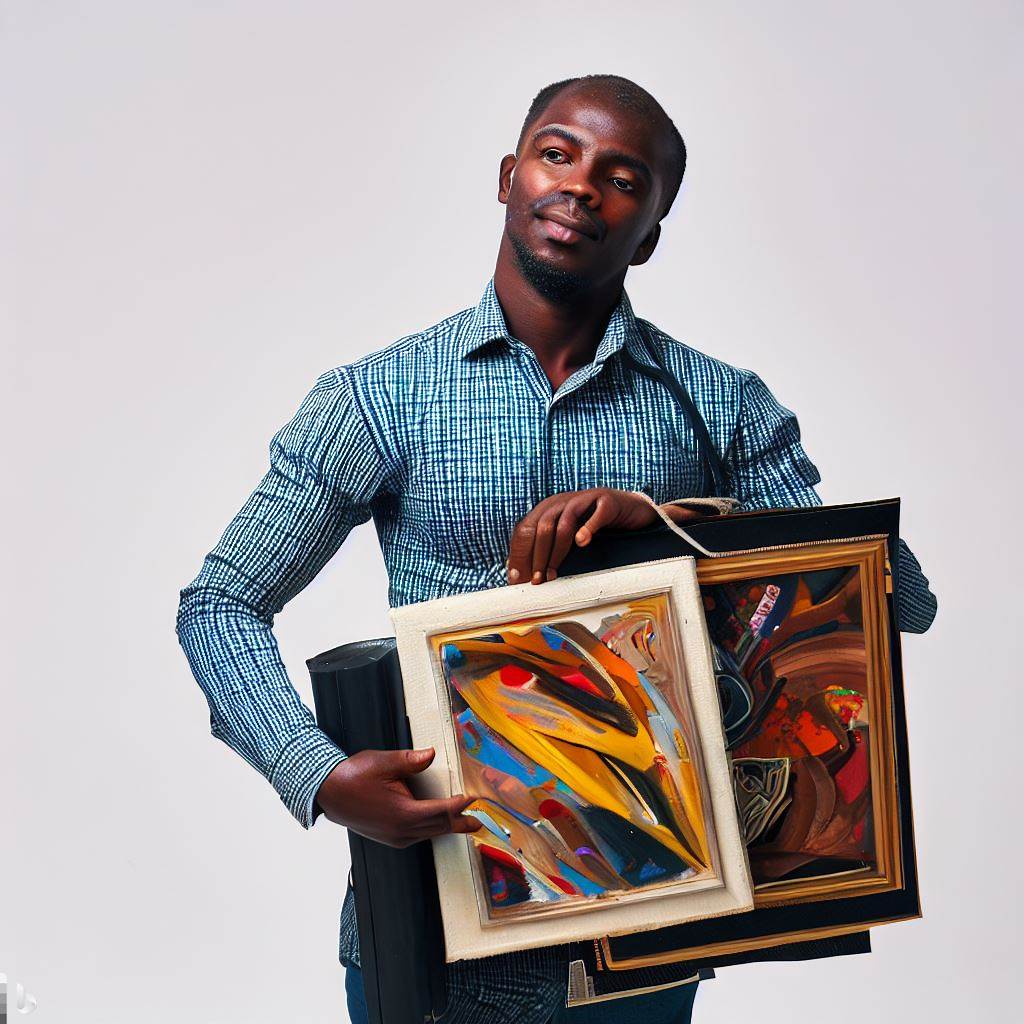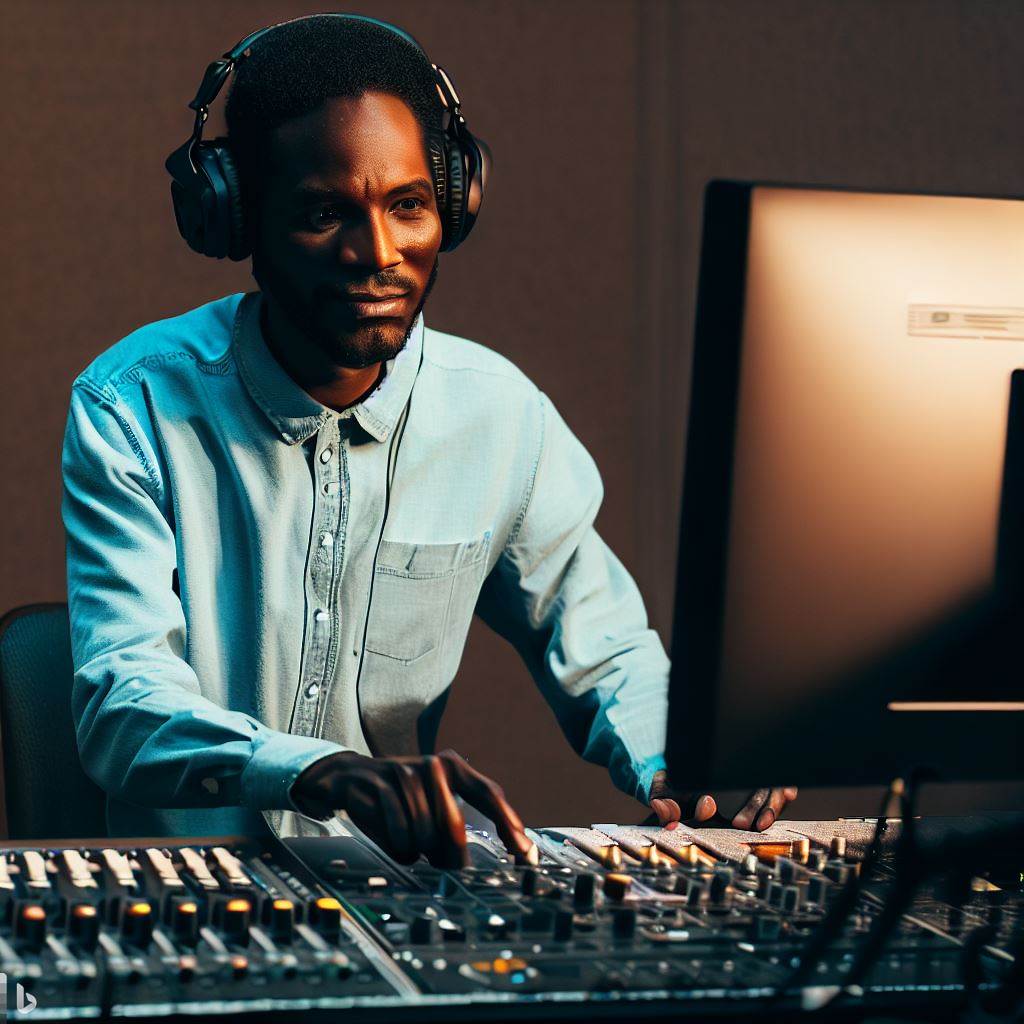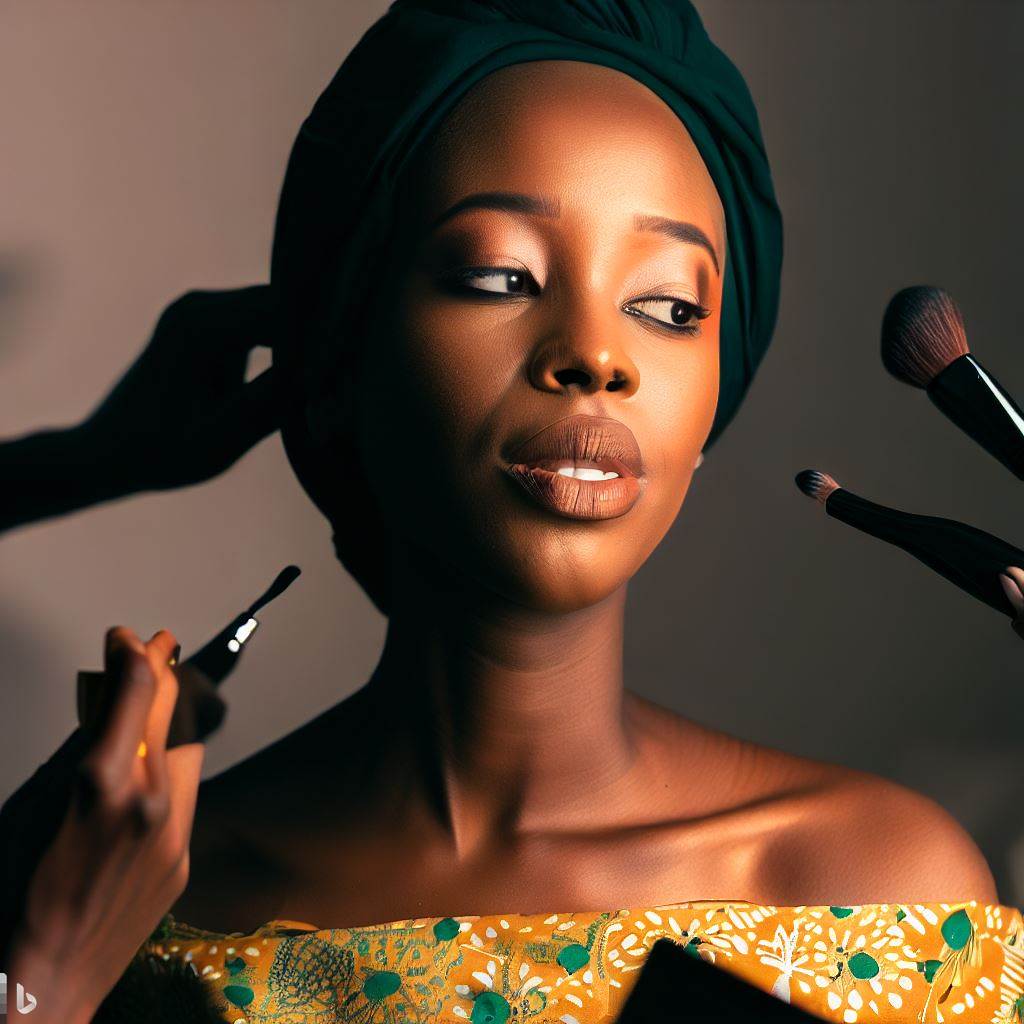Introduction
Embarking on a journey through the dynamic realm of artists’ agents in Nigeria opens doors to a world of creativity, representation, and collaboration.
Importance of Artists’ Agents in Nigeria
- Amplifying Exposure: Agents serve as bridges, connecting artists with opportunities for greater visibility on local and global platforms.
- Navigating Complexities: The Nigerian art scene can be intricate; agents provide guidance in contracts, negotiations, and legal matters.
- Time and Energy: Agents handle administrative tasks, allowing artists to focus on their craft without distractions.
- Strategic Partnerships: Agents cultivate relationships with galleries, curators, and collectors, fostering growth and sustainability.
- Cultural Advocates: Agents promote Nigerian art, contributing to the nation’s artistic legacy and international recognition.
Intricate and vital, artists’ agents in Nigeria are catalysts propelling the nation’s artistry to remarkable heights.
Understanding the Role of an Artist’s Agent
A. Definition of an artist’s agent
An artist’s agent is a professional representative who works on behalf of an artist to manage their career and maximize their opportunities.
B. Responsibilities of an artist’s agent
- Negotiating deals: An artist’s agent is responsible for negotiating contracts, fees, and agreements with clients, galleries, and other industry professionals.
- Promotion and marketing: Agents handle the promotion and marketing of the artist’s work, ensuring it reaches a wider audience through various channels.
- Managing relationships: Agents build and maintain relationships with clients, collectors, galleries, and other industry stakeholders.
- Career guidance: They provide guidance and strategic advice to artists, helping them make informed decisions that benefit their long-term career goals.
- Financial management: Agents handle financial matters, including invoicing, budgeting, and ensuring artists receive proper compensation for their work.
- Networking: Artists’ agents actively network and collaborate with other professionals in the art industry to create opportunities for their clients.
- Research and trend analysis: Agents stay updated on current art trends, market demands, and industry developments to advise artists accordingly.
C. Benefits of having an artist’s agent
- Professional representation: An artist’s agent acts as a professional representative, leveraging their expertise to negotiate favorable deals on behalf of the artist.
- Time-saving: Agents handle administrative tasks, allowing artists to focus on their creative process and artistic growth.
- Industry knowledge: Agents have extensive knowledge of the art industry, enabling them to provide valuable insights and advice to artists.
- Increased exposure and opportunities: Agents have established networks and connections, which can result in more exhibition opportunities, collaborations, and sales.
- Strategic career planning: Agents assist artists in developing long-term career plans, identifying goals, and implementing effective strategies to achieve them.
- Financial management: Agents handle financial aspects, ensuring artists receive fair compensation and assisting with financial planning for future projects.
- Emotional support: Agents provide emotional support and guidance to artists, helping them navigate challenges and maintain a positive mindset.
Essentially, an artist’s agent plays a vital role in managing an artist’s career, serving as a representative, negotiator, marketer, and mentor.
Working with an agent can bring numerous benefits, including professional representation, increased exposure, career guidance, and financial management.
Artists can focus on their creativity while their agents handle the business side of their career, resulting in a more balanced and successful artistic journey.
Read: Cultural Representation in Nigerian Animation
Qualifications and Skills Needed
A. Education and background requirements
- A bachelor’s degree in arts, business, or a related field is generally required.
- Some employers may prefer candidates with a master’s degree in arts administration or a similar field.
- Previous experience in the arts industry, such as working in a gallery or arts organization, is beneficial.
- An understanding of Nigerian art and culture is important for connecting with artists and clients.
B. Necessary skills for an artist’s agent
- Excellent communication and negotiation skills are essential for an artist’s agent.
- Strong organization and time management skills are necessary to handle multiple artists and projects.
- Knowledge of marketing and promotional strategies to effectively promote artists and their work.
- Ability to assess the market and identify opportunities for artists to showcase their work and gain recognition.
- Good interpersonal skills to build relationships with artists, clients, and other industry professionals.
- Flexibility and adaptability to navigate the ever-changing art market and industry trends.
C. The importance of networking and building relationships
In the art industry, networking and building relationships play a significant role in an artist’s agent’s career in Nigeria.
- Attending art events, exhibitions, and industry conferences provides opportunities to meet artists and potential clients.
- Building a network of contacts, including artists, galleries, collectors, and curators, expands an agent’s reach.
- Collaborating with other professionals in the industry can lead to new projects and increased exposure for artists.
- Maintaining strong relationships with artists and clients requires trust, reliability, and effective communication.
- Referrals from satisfied clients and positive word-of-mouth can lead to new opportunities and success.
Basically, becoming an artist’s agent in Nigeria requires a combination of education, skills, and networking abilities.
A successful agent should have a solid educational background in arts or business, and relevant experience in the industry.
Skills such as communication, organization, marketing, and market analysis are crucial for effectively representing artists.
Furthermore, networking and building relationships are essential for expanding one’s client base and staying connected within the art community.
By developing these qualifications and skills, aspiring agents can thrive in the dynamic and diverse Nigerian art scene.
Read: A Day in the Life of a Nigerian Journalist
Steps to Becoming an Artist’s Agent in Nigeria
A career as an artist’s agent in Nigeria can be fulfilling and lucrative, but it requires a strategic approach.
If you are passionate about art and have a desire to support talented artists, here are the steps you can follow to become an artist’s agent in Nigeria:
A. Research and Familiarization with the Nigerian Art Industry
- Start by immersing yourself in the Nigerian art industry.
- Research and familiarize yourself with the local art scene, including artists, galleries, art events, and trends.
- Stay updated on the latest developments in the industry.
- Network with other art professionals, including artists, gallery owners, curators, and collectors.
- Attend art exhibitions, fairs, and workshops to expand your knowledge and make connections.
B. Gaining Practical Experience in the Field
- Practical experience is crucial in becoming an artist’s agent.
- Look for opportunities to work or volunteer in art-related organizations, galleries, or with established agents.
- Assist artists with their exhibitions, marketing, and administrative tasks.
- This hands-on experience will give you insights into the challenges and requirements of the job.
C. Establishing Connections with Artists and Galleries
- Build relationships with artists whose work you admire and believe in.
- Attend their exhibitions, engage with their art, and offer your support and feedback.
- Show your commitment to their artistic journey.
- Develop a network of galleries and understand their preferences and requirements.
- Establish connections with gallery owners, curators, and managers.
- Attend gallery openings and events to meet potential clients.
D. Developing Negotiation and Contract Management Skills
As an artist’s agent, you will negotiate deals, contracts, and agreements on behalf of your artists.
Develop strong negotiation skills, ensuring your artists receive fair compensation for their work.
Learn about intellectual property rights, licensing, and copyright laws to protect your artists’ interests.
Understand contract management to ensure all parties involved are satisfied and fulfill their obligations.
Keep yourself updated on industry standards, pricing, and market trends.
Stay informed about the value of artworks to effectively market and sell your artists’ work.
Remember, becoming an artist’s agent in Nigeria requires dedication, hard work, and continuous learning.
Stay passionate about art, nurture your relationships, and always strive for the success of your artists.
Read: Exploring the Role of Journalism in Nigeria’s Democracy

Challenges and Opportunities in the Artists’ Agent Career
A. Unique Challenges Faced by Artists’ Agents in Nigeria
- Limited recognition and support for the arts industry in Nigeria.
- Difficulty in finding talented artists and convincing them to sign with agents.
- Lack of standardized contracts and legal protection for agents.
- High competition among agents, leading to price wars and undercutting.
- Inadequate infrastructure and resources for promoting and showcasing artists.
- Cultural biases against certain art forms and genres.
- Artists’ agents often struggle with managing multiple clients and their unique demands.
- Artists’ agents may face challenges in finding reliable buyers and negotiating fair deals.
B. Opportunities for Growth and Success in the Field
- Nigeria’s growing economy provides a larger market for art sales and investments.
- The rise of digital platforms and social media allows for wider reach and exposure.
- Increased interest in African art globally creates opportunities for international collaborations and exhibitions.
- Artists’ agents can benefit from networking events and art fairs to connect with buyers and collectors.
- Developing partnerships with art galleries, museums, and corporate organizations can lead to expanded opportunities.
- Investing in artists’ development and nurturing long-term relationships with them can result in mutual success.
- Exploring niche markets and specializing in specific art styles or genres can attract loyal clients.
C. Tips on Overcoming Challenges and Making the Most of Opportunities
- Stay informed about the changing dynamics of the art industry and market trends.
- Build a strong network of artists, collectors, galleries, and industry professionals.
- Invest in marketing and promotion to increase visibility and reach a wider audience.
- Develop expertise in contract negotiation and legal matters to protect the interests of both artists and agents.
- Collaborate with other agents and professionals to share resources and expand opportunities.
- Continuously seek professional development and learning opportunities in order to stay competitive.
- Adapt to technological advancements and leverage digital platforms for showcasing and selling art.
- Establish transparent and fair business practices to build trust and credibility with clients and artists.
Lastly, while artists’ agents in Nigeria face unique challenges, such as limited recognition and competition, there are also numerous opportunities for growth and success.
By overcoming these challenges through networking, utilizing digital platforms, and developing expertise, agents can make the most of the opportunities available to them in the thriving Nigerian art industry.
Read: Cultural Influence on Makeup Artistry in Nigeria
How to Launch a Successful Artist’s Agent Career
A successful career as an artist’s agent requires a combination of skills, strategies, and knowledge.
Here are four essential steps to help you launch your career:
A. Building a strong portfolio and reputation
- Create a portfolio showcasing your skills, experience, and successful collaborations with artists.
- Attend art exhibitions, events, and networking sessions to establish connections within the industry.
- Collaborate with emerging artists to gain experience and add diverse works to your portfolio.
- Ensure your reputation by delivering exceptional results, being reliable, and maintaining professionalism.
B. Utilizing online platforms and social media for promotion
- Create a professional website to showcase your portfolio, client testimonials, and contact information.
- Build a strong social media presence on platforms like Instagram, Twitter, and LinkedIn.
- Regularly update your social media accounts with engaging content, including artist spotlights and industry news.
- Collaborate with influencers and bloggers to reach a wider audience and increase your online visibility.
C. Seeking mentorship and guidance from established agents
- Research and identify successful artists’ agents who are willing to mentor and guide aspiring agents.
- Reach out to established agents and request informational interviews or shadowing opportunities.
- Learn from their experiences, strategies, and professional advice to develop your own career path.
- Build relationships with established agents for potential collaborations and referrals.
D. Continuously learning and staying updated with industry trends
- Stay updated with the latest industry trends, market demands, and emerging artists.
- Attend workshops, conferences, and art-related events to expand your knowledge and network.
- Subscribe to art magazines, newsletters, and online publications to stay informed.
- Invest in continuous learning, such as courses in negotiation skills, marketing, and art history.
Launching a successful artist’s agent career requires dedication, hard work, and a proactive approach.
Building a strong portfolio, utilizing online platforms and social media, seeking mentorship from established agents, and staying updated with industry trends are key steps towards achieving success in this field.
You Might Also Like: Music and Activism: Nigerian Artists’ Role
Legal Considerations and Ethical Responsibilities
In the Nigerian artist agent profession, adhering to legal regulations and ethical responsibilities is paramount. Agents must register their agencies with the government for credibility.
Copyright laws and intellectual property rights knowledge safeguard clients’ work. Proficiency in contract laws aids in drafting, negotiating, and honoring contracts, preventing disputes.
Agents must meet tax obligations, follow financial rules, and maintain accurate accounts.
Ethical obligations are significant; prioritizing clients’ interests and maintaining confidentiality is key.
Avoiding conflicts of interest ensures impartiality, while transparent communication about fees and finances builds trust.
Agents must represent clients professionally, upholding industry integrity.
Maintaining meticulous records, including contracts and payments, enables transparent financial reporting.
Agents need to stay updated on industry trends to offer optimal service. In this dynamic field, legal compliance and ethical conduct form the foundation of a reputable artist agent career in Nigeria.
Conclusion
- To recap, this article discussed the career of artists’ agents in Nigeria, providing a comprehensive guide.
- Aspiring artists’ agents in Nigeria should be encouraged to pursue their career dreams, as there is a growing demand for their services.
- In summary, it is crucial for artists’ agents to understand the Nigerian art industry, build strong networks, and continuously educate themselves through workshops, books, and online resources.
Further reading can be found in books like “The Business of Being an Artist” by Daniel Grant and “Art, Cultural Production, and the ‘Creative Economy’” edited by Justin O’Connor and Xin Gu.
Additionally, attending art exhibitions, conferences, and engaging with industry professionals will contribute to their success.




